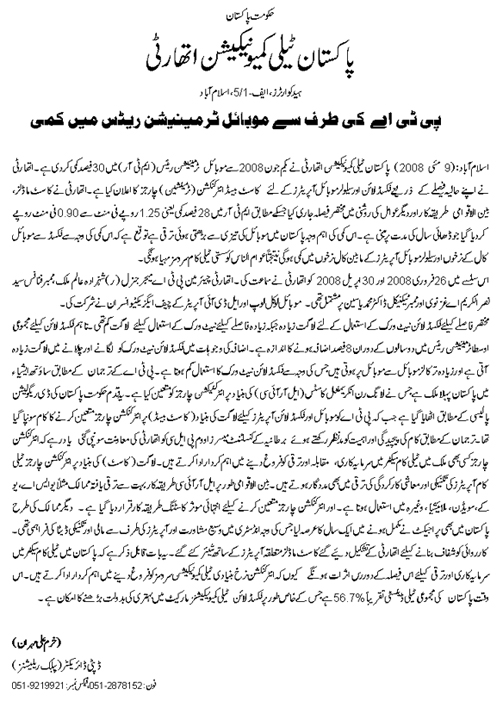Press Release
PTA Reduces Mobile Termination Rates
Islamabad: The Pakistan Telecommunication Authority (PTA), has reduced Mobile Termination Rates (MTR) with effect from 1st June 2008 by about 30%. The Authority announced cost-based interconnection (termination) charges for fixed-line as well as cellular mobile operators vide its recent determination.
The Authority after considering the results of cost models, international benchmarks and other factors, issued a short determination whereby MTR has been reduced by 28% i.e. from Rs.1.25/- to Rs.0.90/- over a period of two and half years (2.5 years). This reduction is mainly due to rapid growth in the mobile market of Pakistan. It is expected that the reduction in MTR would reduce fixed to mobile tariffs as well as off-net tariffs for cellular mobile operators resulting in more affordable telecom services for the general public.
In this connection hearings were conducted by the Authority on February 26, 2008 and April 30, 2008 comprising Chairman PTA, Major General (R) Shahzada Alam Malik, Member Finance, Syed Nasrul Karim A Ghaznavi and Member Technical, Dr. Mohammad Yasin and were attended by Chief Executive Officers of the Mobile, Local Loop and Long Distance International Operators.
For fixed-line telecom sector, the cost models showed higher interconnection charges for local termination, whereas for long-distance termination the results turned out to be lower than the existing applicable rates. However, the overall average termination rates are estimated to increase by about 8% over a period of two years. The changes in the fixed- line termination rates are mainly attributable to higher costs in maintaining and rolling out fixed-line access networks and reduction in traffic owing to shifting of traffic from traditional fixed-line networks to mobile networks.
PTA spokesman said that Pakistan is the first country in South Asia to have determined the interconnection charges based on Long Run Incremental Costs (LRIC). This step was taken in line with the deregulation policy of Government of Pakistan whereby PTA was assigned the task to determine cost-based interconnection charges for mobile and fixed-line operators, he added. According to the spokesman, keeping in view the significance and complexity of the task, the Authority engaged UK-based consultant M/s Ovum plc. to assist the Authority in determining interconnection charges using Fully Allocated Cost (FAC) under historical costing, bottom-up LRIC and international benchmarking.
It may be noted that interconnection charges play an important role in promoting investment, competition and growth of the telecom sector in any country. The cost based interconnection charges also help in improving economic and technical efficiency of telecom operators. Internationally, LRIC methodology is used in many developed countries such as USA, UK, Sweden, Malaysia etc and has been declared to be the most efficient costing methodology in determining interconnection charges.
Likewise in other countries, the project took more than a year to complete due to thorough industry consultation and immense financial & technical data requirement from the operators. To make the process fully transparent, the cost models developed by the Authority were shared with the concerned operators.
It may be mentioned that this decision will have far reaching impact on the growth and investment in the telecom sector of Pakistan, as interconnection rates are critical input for proliferation of basic telecommunication services. At present, Pakistan has around 56.7% of combined tele-density, which is expected to increase further specially providing impetus to the fixed-line telecommunications market
(Khurram Ali Mehran)
Deputy Director (PR)



